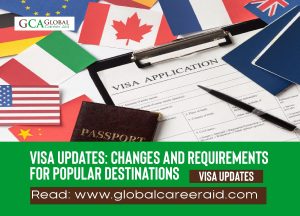Introduction
Embarking on a journey to Canada for educational pursuits is an exciting endeavor, but the process of obtaining a study visa can be intricate. In this guide, we will meticulously navigate the steps, requirements, and essential details for a seamless transition to the Canadian education system.
Understanding the Basics
Before delving into the specifics, it’s crucial to grasp the fundamentals of Canadian study visas. These visas, also known as study permits, are mandatory for international students planning to pursue education in Canada. They are generally valid for the duration of the program and come with certain conditions.
Eligibility Criteria
To be eligible for a Canadian study visa, prospective students must first secure admission to a Designated Learning Institution (DLI). This institution must be recognized by the Canadian government, ensuring a high standard of education. Additionally, applicants must prove their ability to cover tuition fees, living expenses, and return transportation.
The Application Process
1. Gather Necessary Documents
Compile a comprehensive set of documents, including a letter of acceptance from the DLI, proof of identity, financial statements, and a valid passport. Ensure that all documents are accurate and up-to-date.
2. Online Application Submission
Navigate to the official website of Immigration, Refugees, and Citizenship Canada (IRCC) to complete the online application. Pay close attention to each section, providing accurate and honest information.
3. Biometrics
As part of the application process, applicants may need to provide biometric information. This involves fingerprinting and a digital photograph and is typically done at designated Visa Application Centers.
Financial Preparation
Canada has specific financial requirements that applicants must meet to ensure they can sustain themselves during their studies. Proof of funds can include bank statements, scholarship confirmations, or a letter of financial support.
Medical Examination
students may need to undergo a medical examination, particularly if their program exceeds six months. Find a panel physician approved by the Canadian government and schedule the examination well in advance.
Language Proficiency
Most academic programs in Canada are taught in English or French. Applicants may need to prove their proficiency in one of these languages by taking a standardized test such as IELTS or TOEFL.
Travel Insurance
While not a visa requirement, obtaining travel insurance is highly recommended. It ensures that students are covered for medical emergencies, unexpected travel disruptions, and other unforeseen events during their stay in Canada.
Post-Arrival Responsibilities
1. Attend Orientation
Upon arriving in Canada, attend any orientation sessions provided by the DLI. These sessions offer valuable information about academic expectations, campus facilities, and important resources.
2. Obtain a Social Insurance Number (SIN)
International students are required to obtain a Social Insurance Number to work in Canada, whether on or off-campus. This is a crucial step for those planning to engage in part-time work during their studies.
Conclusion
Navigating the process of traveling to Canada with a study visa requires meticulous planning and adherence to various requirements.
By understanding the eligibility criteria, following a systematic application process, and preparing for financial and logistical aspects, prospective students can embark on their educational journey with confidence.
As the landscape of immigration policies may evolve, it is recommended to stay updated with the latest information on the official IRCC website or consult with an immigration professional for personalized guidance.




